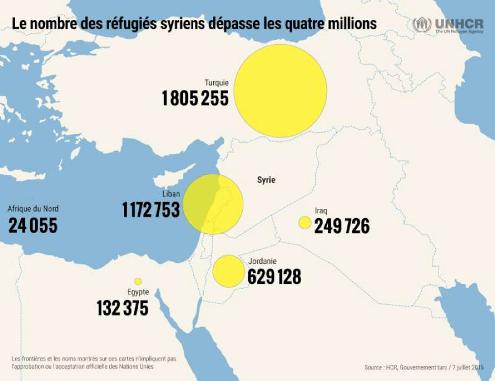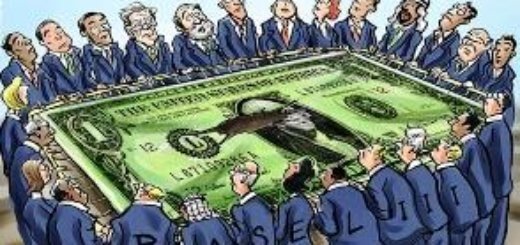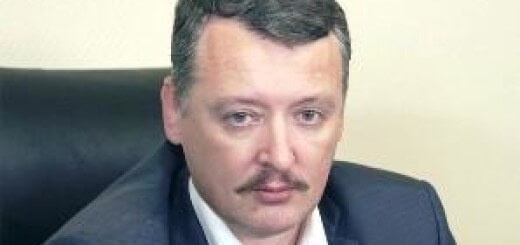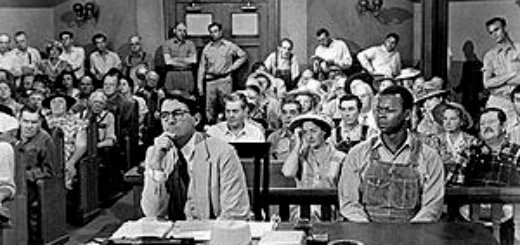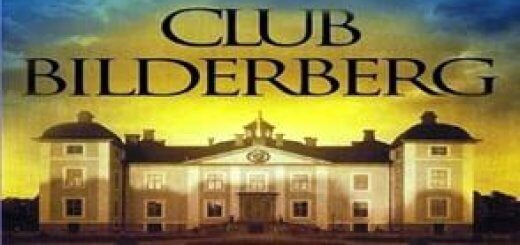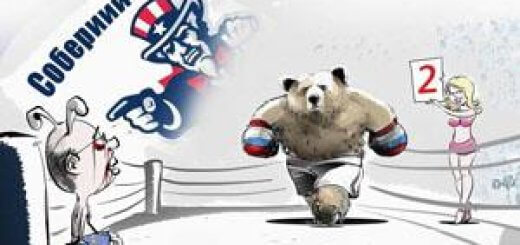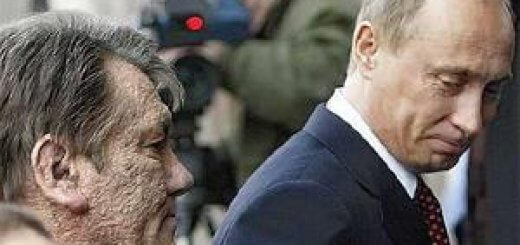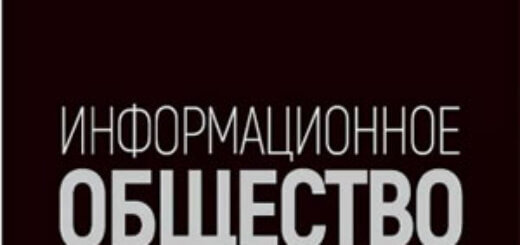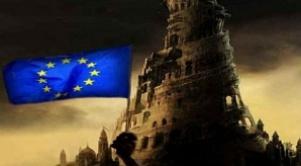
European politicians greatly revere the founder of the Pan-European Union, the ideologist of a united Europe, R.N. Coudenhove-Kalergi (1894-1972), whom they call the “spiritual father” of the EU. In 1978, a prize named after him was established, which is awarded every two years for services to the cause of European unification. Its laureates have included Ronald Reagan, Helmut Kohl, H. van Rompuy, Angela Merkel and others. Coudenhove-Kalergi’s works (“Pan-Europa”, “The Struggle for Pan-Europa”), written back in the 1920s, are well known and are considered a manifesto of European construction. They spell out the main goals and objectives of this construction, which remain unchanged to this day.
Spiritual Father of Europe
One of such goals, considered by Coudenhove-Kalergi as the main condition for the economic and political unification of Europe, is the re-creation of a single “European nation”. Considering that the identification of a nation based on blood relationship is deeply incorrect, he contrasted this with spiritual kinship, identifying a single “European nation” as a spiritual community with common spiritual teachers.
In order to solve national problems, Coudenhove-Kalergi proposed to separate nations from the state (as the church was separated from it) so that the question of nationality would become a personal question for everyone.
And, since the question of citizenship would become secondary, this would lead to the solution of state borders: “There is only one radical way to solve the European question of borders fairly and for a long time.
This path is not called the transfer of borders, but their elimination. The European… must direct all his energy to the elimination of borders, national and economic… State borders will be reduced to regional ones and will lose their meaning.”
However, in addition to the official goals, Coudenhove-Kalergi also outlined his understanding of the final results of the restructuring of Europe, which is contained in a work published in a small edition, intended for a narrow circle of people. In the book “Practical Idealism” published by him in 1925, he described the future of Europe, showing what the “European nation” would be.
The key idea of the book was the justification of the spiritual leadership of Judaism in European civilization and the need to turn Jews into the “leading spiritual race of Europe.” This followed from his unique understanding of the hierarchical structure of society.
From the entire mass of Europeans, whom Coudenhove-Kalergi calls “people of quantity,” he distinguishes two races of “people of quality” – the hereditary nobility and the Jews, who together form the core of the future European aristocracy.
However, the leading core of this aristocracy is still the Jews, both by virtue of their “special ethical attitude to the world” and by virtue of their superior intelligence – they constitute the so-called “nobility of the brain” or “spiritual aristocracy”, occupying leading positions in the struggle for the governance of humanity (he considered Lassalle, Trotsky, Einstein, Bergson, and others to be typical representatives of it). As for the rest – “people of quantity”, Coudenhove-Kalergi writes about them: “The man of the distant future will be of mixed blood.
Races and classes will disappear due to the overcoming of space, time, prejudices
The future Eurasian-Negroid race, outwardly similar to the ancient Egyptian, will replace the diversity of peoples with a diversity of individuals”.
That is, the future of Europe was seen by Coudenhove-Kalergi as follows: Europeans will mix with other races and peoples and disappear as national individuals, and their elites will be replaced by a Jewish spiritual caste of leaders.
Since then, the plans have not changed, and what is being implemented today in the European Union fits in completely with the projects outlined by its “spiritual father”. And it is obvious that these projects are incompatible with the preservation of either national states, or national borders, or nations themselves. So the assertions that European politicians, pursuing an insane migration policy, do not know what they are doing are from the evil one.
THE MASTERS OF EUROPE
The current well-planned and controlled “migration chaos” in Europe is not a sudden invasion, but just another tactical operation on the path of fundamental restructuring of Europe.
She is working to dismantle nation-states and strengthen the European Union, whose leadership does not represent the interests of citizens, but of a large European multinational business embedded in supranational structures.
The most important role here is played by the European Industrialists’ Round Table or the European Round Table (ECT), created in 1983, which unites representatives of 45 major European corporations, among which the most influential are Bayer, Shell, BP, DaimlerChrysler, Ericsson, Nestle, Nokia, Petrofina, Renault, Siemens, Solvay, Total and Unilever, the heads of which regularly attend meetings of the Bilderberg Club. Today it is headed by Leif Johansson, Chairman of the Board of Directors of the Swedish company Ericsson.
SEX is one of the key pressure groups exerting decisive influence on the most senior politicians and ensuring the formation of a strategic alliance between big business and members of the European Commission.
The organization’s goal was initially proclaimed to “stimulate the global competitiveness of European industry,” but its main task was to change the way Europe is governed in the direction of its complete unification in the interests of big business, in which its economic system would have a single decision-making center.
Intensive neoliberal-style treatment of top managers and the appropriate selection of personnel led to the fact that if in the 80s it was still possible to distinguish between groups of protectionists and globalists within the CEN, by the early 90s all the members of the Round Table were already unanimous in upholding the full openness of markets and borders and took a clearly pro-Atlanticist position.. Globalization and major projects of a general supranational nature have become the main topic of discussion here.
Today, the main issue on the CEN agenda is the creation of the Transatlantic Trade and Investment Partnership (TTIP) – the free trade agreement between the EU and the United States, which British Prime Minister David Cameron called “the most important bilateral trade agreement in history.”
It was planned to conclude it at the end of 2014, then the issue was postponed to 2015, and now to 2016. The TTIP, as it is thought, should lead to full corporate control over the economy and the social sphere, minimizing any government regulation, so negotiations on the project were held behind closed doors, in secret from the European public, and the European Commission published a brief overview of the relevant documents only in January 2015.
The chronology of the agreement’s preparation is as follows: 1990 – the Transatlantic Declaration was adopted, 1995 – the Transatlantic Business Dialogue business initiative groups were established, in 1998 – the Transatlantic Economic Partnership Advisory Committee, and in 2007 – the Transatlantic Economic Council, consisting of representatives of leading Western firms.Finally, in 2011, a high-level expert group was established, which recommended starting negotiations on an agreement in 2013.
A striking indicator of the leading role of the European Round Table in this project was the creation in March 2013 following a meeting between A. Merkel and F.Hollande met with the leadership of the joint Franco-German Working Group in order to develop a unified international trade strategy that serves the private interests of Europe’s largest companies, whose representatives became part of it.
As one observer put it, “the requirements of the CEN are to put the EU fully at the service of enterprises, and nothing more“. The Group put forward 32 recommendations of an ultra-liberal antisocial nature, which formed the basis of proposals for European-American negotiations on the creation of the TTIP. The main thing here is the openness of markets, investment protection and labor market reform in order to “increase competitiveness.”
The CEN is closely linked to the Transatlantic Political Network (TPS), a powerful Euro-Atlantic lobby working to create not only a transatlantic market (by 2020), but also a European-American bloc at the political and military level and preparing documents for the TTIP agreement.
TPS was formed in 1992, and its members are the largest multinational corporations and banks, including Boeing, EADS, United Technologies Corporation, Ford, IBM, Microsoft, Siemens, BASF, Bertelsmann, AT&T, Nestle, Deutsche Bank, Citigroup, Warner & Walt Dysney.
In addition, 60 members of the European Parliament are members of the network (it is significant that of its 22 commissions, 8 are headed by members of the TPS) and 37 members of the US Congress [8]. The Network relies on developments from leading Western think tanks (the Royal Institute of International Relations/Chatham House, the Aspen Institute, the European-American Business Council, the Council on Foreign Relations, the Brookings Institution, the European Institute for Strategic Studies, the French Institute of International Relations, the Center for Strategic and International Studies, etc.).
In July 2015, the European Parliament, using effective political and informational levers of pressure, and first of all, intimidation by the “Russian threat” and the need for Euro-Atlantic solidarity, adopted a resolution supporting the TTIP (436 MEPs against 241).
While not binding, it clearly demonstrates the mood of the members of Parliament, whose position will determine the ratification of the TTIP treaty.
It is significant that the authorities did not allow any public discussion at this stage either, since the majority of Europeans do not support an agreement that would mean a complete assertion of corporate power and bury forever the remnants of Europe’s cultural, environmental and social values.
However, no real resistance can be offered due to the deep disintegration of European society, which is caused by the demographic revolution that has been taking place for 20 years, which is one of the main factors in the establishment of corporate power.
THE SUBSTITUTION OF EUROPEAN NATIONS
Many researchers call this revolution a demographic catastrophe, since the European region has stopped reproducing its population.
By 2050, excluding immigration, instead of the current 728 million Europeans, the contingent will number 600 million, which is equivalent to the loss of the population living today in Germany, Poland, Denmark, Norway, Sweden and Finland combined.
The last time such a significant population decline was observed in Europe was only during the plague epidemic of 1347-1352.
The situation is particularly serious in Germany (the population may decrease from 82 million to 59 million by 2050), Latvia, Hungary, and Portugal. In the same countries where the birth rate is relatively high (Great Britain, France, Sweden), it is provided mainly by Muslims.
As A. Rahr, director of the Russian and CIS Department of the German Foreign Policy Council, once said frankly, “we are at a crossroads, and it is difficult to say where this will lead.”… Yes, we can say that the “white race” is dying out.… It is still difficult to conduct such discussions openly, because there is an electorate.”
Naturally, this leads to the inability of the EU to maintain its existing social integrity: there will soon be a catastrophic shortage of workers, which already calls into question the very preservation of the social security system.
The numerous generations that were born in the demographic boom after World War II are still working in Europe, but when they retire, the system will radically change.
Therefore, the frantic actions of European politicians aimed at raising the retirement age, reviewing disability support schemes, etc., are associated with an attempt to delay the decline in high standards and consumption for as long as possible, which will inevitably be followed by its rapid collapse.
The most important condition for its prevention is the constant and growing influx of immigrants. As stated in one of the secret reports of the French government back in the early 2000s, the European Union has no alternative to the vocation of 75 million migrants.
At the same time, French experts recognized the problems this would cause in the hybrid racial society being created.
However, European politicians will never change the situation. They will make beautiful and bold statements about the failure of the multiculturalism policy, carry out demonstrative anti-immigration actions, but they will not change their course, as they rely on migrants – this is the strategic line of the transnational class, meeting its fundamental interests.
By the early 2000s, about 400,000 people were officially seeking asylum on the European continent every year, and more than 500,000 people began to travel here through various illegal channels.
The total number of illegal immigrants in Europe today was from 5 to 7 million people (and these are approximate estimates, since there are no official European statistics on the number of illegal immigrants).
The largest number of illegal immigrants is concentrated in France, Germany, Italy and Spain, in each of which there were up to 1-1.5 million, and the number increased by 100 thousand annually.
The main stream went and is going from North Africa to Spain, and the other from Turkey through Greece, Albania and Italy.
The milestone for Europe in this regard was 2011, the year of the “Arab revolutions,” when almost 113,000 EU border crossings were recorded in the first nine months alone [13].And already in 2014, the number of refugees who entered Europe through the Mediterranean amounted to 626 thousand people.
Today, according to the ILO, out of 175 million migrants in the world, 56 million. They live in Europe, of which 27.5 million carry out economic activities here. In some European countries, such as Luxembourg and Switzerland, the share of foreigners in the total workforce reaches 25%. They mostly take jobs that are not in demand by local workers: dirty, hard work that does not require qualifications, low- and medium-skilled work in the service sector, care and maintenance work in the private sector, seasonal work in agriculture and tourism.
A large and virtually uncontrolled segment of the global labor market is formed by illegal migrants, who, according to the ILO, account for about 1/3 of all international migrants. They are mainly employed in the small or shadow sector of the economy, the scale of which is growing in all countries. In Europe, the European Commission estimates that it reaches between 8 and 30% of GDP in individual countries, and 20% in Europe as a whole.
Excluding Eastern Europe, the countries with the largest shadow sector include Greece (30-35%), Italy (27.8%), Spain (23.4%) and Belgium (23.4%). The average position is occupied by Ireland, Canada, France and Germany (from 14.9 to 16.3%). The shadow sector began to grow especially rapidly after the 2008 crisis.Its most significant segment is the drug trade, the main transshipment base of which is Kosovo.
The drug trade encompasses an extremely extensive network involving Kosovo Albanians, Bulgarian and Turkish mafias, Czech couriers, British dealers, and the Italian mafia, including Cosa Nostra.
But all of them are only the lowest level of the drug mafia, which is an influential pan-European interstate structure that has a strong foothold in the special services and performs the role of an “invisible manager” in the governments of European countries, actively influencing their geopolitics.
In this regard, illegal migration is an indispensable resource for it, from which more and more new members are recruited into the shadow army of carriers, who are effectively put in a desperate situation.
As a result of these processes, a deep ethno-cultural restructuring is taking place in European countries, in which it is increasingly becoming like a “melting pot” (the concept of total national and racial mixing, promoted by the Zionist Union through Israel Zangwill (Marshall) since the beginning of the twentieth century – editor’s note).
Europeans are being replaced by other ethnic groups, which, mixing with each other, really form a “nation of migrants” or “new nomads”.
A GIFT FOR BUSINESS
The current migration wave has become unprecedented, as it turned out to be associated with a well-organized and controlled flow of refugees from the Middle East and North Africa, caused mainly by the events in Syria, from where more than 4 million people have already left for neighboring countries (according to the UN Refugee Agency, this is the most serious refugee crisis in the last quarter of a century).
Since the beginning of the year, more than 500 thousand people have arrived in Europe, and in August alone, 156 thousand refugees were registered. According to experts, it is possible that up to 1 million migrants will move to the northern Mediterranean coast this year.
However, it is characteristic that, describing the troubles and sufferings of refugees, the official media carefully cover up the question of who finances and organizes the main flows and why most of the migrants are healthy young men who break through the chains of containment at the borders very smoothly.
However, recently, more and more information has begun to appear about the sponsors of the resettlement, which led to talk about the artificial nature of the crisis.
In particular, Austrian journalists, citing intelligence sources, reported that American organizations and foundations were involved in this, paying for the services of “guides” transporting migrants to Europe.
Other journalists refer to “human rights organizations” funded by the Rothschilds. And the Serbian publication Pecat, having studied the details of the well-organized departure of Kosovo Albanians that took place during the month (the reasons for which could not be explained), put forward the version that ISIS was behind it, which set the task of sending 4 thousand fighters to Western Europe (of which 2 thousand arrived).
It is also characteristic that the attitude towards refugees and the very tone of the media have changed dramatically. Migrants and refugees have experienced tragedies before, as illegal migration has not stopped since the beginning of the war in Syria, but no one has taken such care of them.
And then the situation changed. According to Syrian journalist and writer Mustafa Al-Miqdad, “now that their terrorist war against us has exhausted most of our resources, the organization of immigration of our youth is beginning to take on a large scale, which suggests the idea of preparing a new plan aimed at depriving Syria of its human and scientific potential, while playing on the sensitive strings of the “unbearable suffering of migrants” in the face of European and Western public opinion. …
They may even adopt special rules that apply only to “Syrian migrants.”… The last step, which, indeed, will deprive Syria of the age group that can defeat terrorism and rebuild the country; and this means continuing the militant Western policy by other means, but pursuing the same goals in the event of the failure of their ongoing operations to destroy, destroy and expand terrorism.”
It is truly significant that while the media is shouting about the weakness of the Brussels bureaucracy, about the Europeans’ fear of an influx of refugees, European big business is not hiding, but even openly admits that this influx has become a real gift for it, or a “wonderful surprise”, as one of the experts put it, which allowed them to get cheap labor in anticipation of the agreement. about TTIP. As A. Rahr wrote, “now the refugees will be carried in their arms.”
As a result, the overall picture of what is happening began to emerge more and more clearly, revealing the dual strategy of the European ruling class in the “migration crisis”: to concentrate useful economic migrants in the center of Europe, redirecting radical elements, the so-called “sleeper agents” of ISIS, to Eastern Europe.
The main benefit from this was received by the German business community, which unanimously supported the admission of migrants.
For example, the president of the Federal Association of German Industry (BDI), a participant in the Bilderberg Club conference, businessman Ulrich Grillo, said at the end of 2014 that Germany has long been a country of migrants and should remain one.:
“As a prosperous country and because of Christian love for our neighbor, our country must afford to accept more refugees” (by the way, it was Grillo who condemned German industrialists for sympathizing with Russia, saying that the interests of businessmen should give way to economic sanctions and that the position of the German economy on the most important issues of foreign policy has always been an important factor in international relations).
He is echoed by German Economy Minister and Vice Chancellor Sigmar Gabriel, who said that the influx of migrants would help Germany cope with an aging population and a shortage of personnel in a number of industries.
“If we can quickly educate those who come to us and get them to work, then we will solve one of the main future problems of our economy – the lack of skilled workers.”
In an interview with the German public television channel ZDF, he pointed out that over the next few years Germany will be able to accept at least 500,000 refugees annually (“I have no doubt about it. Maybe we can accept more refugees.”) Indeed, Germany is expected to accept between 800,000 and 1 million refugees this year alone, which is four times more than in 2014.
It is significant that Angela Merkel, calling the influx of migrants to Europe overwhelming and pointing out that this process will change Germany, at the same time promised to speed up the asylum procedure and allocate additional funds to help refugees, calling on other countries to do the same.
According to German analysts, in 2030, Germany will need 6 million jobs in areas such as hospitality, logistics, healthcare and care for the elderly. The BDI also points out that with an unemployment rate of 6.4%, 140,000 engineers, programmers and technicians are missing in the country.
There are 40,000 places left unfilled in the vocational training system, which involves most of the country’s enterprises. And the Prognos analytical center indicates that if nothing changes, the shortage of workers will increase to 1.8 million by 2020 and to 3.9 million by 2040.
There are also forecasts that by 2030 the German economy will face a shortage of 10 million workers. Meanwhile, the vast majority of arrivals are young people with their whole lives ahead of them, and many Syrian refugees are middle-class, well–educated and clearly striving for self-realization in a new place.
Under these conditions, the €10 billion that Germany is going to spend on accepting refugees in 2016 (due to a budget surplus of more than €21 billion) does not represent such a heavy burden here.
As for their integration into the workforce, it is planned to expand The Job of my Life program, which has been in operation since 2013, designed for job seekers in the EU, with language courses and craft studies. Already, as Grillo points out, at the local level, an increasing number of companies are opening their doors to new arrivals. The business has prepared a list of proposals to speed up the recognition of professional and educational qualifications and offers to finance language learning.
The Germans themselves are mentally prepared. According to a ZDF survey, 54% of Germans supported refugees in July, compared with 60% in August. And according to Spiegel magazine, at the end of August, half of Germans wanted Germany to accept even more refugees.
TO WHOM ARE THE TOPS, AND TO WHOM ARE THE ROOTS OR THE ORDER IN GERMAN
As the refugees arrived in Europe, the media actively treated the Europeans in a spirit of tolerance and hospitality, not disdaining to go even to falsification (as in the case of fabricating a photo of a Syrian child washed up on a Turkish shore).
The European Commission has never tired of reminding us of our moral duty, the Geneva Convention and the Charter of Fundamental Rights of the EU.
Jean-Claude Juncker distinguished himself with special eloquence when he delivered a heartfelt speech in the European Parliament about Europe as a “stable harbor and a place of hope,” concluding with a call to unity, which the parliamentarians applauded.
As a result, the European Parliament called for putting solidarity at the center of union policy and creating “a harmonious and effective EU-wide asylum system in order to distribute asylum seekers fairly.”
And then the prose began. Stating the moral duty of all 28 countries for the admission system, A. Merkel and the Swedish Prime Minister demanded a division of responsibility. This plan was proposed by Bonn and Paris, which was announced by Jean-Claude Juncker and approved by the European Parliament.
It provides for the distribution of 160,000 refugees (120,000 from Italy, Greece and Hungary, and 40,000 already present in Europe) between 22 countries, with Germany accepting 26%, France 20%, and Spain 12%. At the same time, the quota system should be mandatory (“we don’t need poetry,” Juncker said), and financial sanctions can be applied to countries that refuse to accept refugees.
This plan is presented as an urgent measure, after which a “permanent reconciliation mechanism” will be developed. It also announced the creation of a special fund in the amount of 1.8 billion. the euro in case of future crises.
However, by adopting this plan, Germany hedged its bets in order to protect itself from radical elements. In the midst of the “migration chaos,” European Commissioner for Energy Gunther Oettinger said that the German constitution should be amended to speed up the decision on both granting and denying refugee status.
At the same time, the second option will apply only to migrants from the so–called “safe countries”, which include those where there are no military conflicts: all EU countries, Ghana, Senegal, as well as the Balkan countries – Serbia, Macedonia, Bosnia-Herzegovina, Montenegro, Albania and Kosovo. At the same time, people from the Balkans, including Albanians, make up 40% of the refugees who arrived here, and, accordingly, they will either be rejected or sent home. But Syria and Iraq are classified as “dangerous” countries.
The issue of quotas has brought Germany and France together, but has provoked opposition from members of the Visegrad Group who have no experience hosting refugees and do not want to host the specified number of refugees.
But Germany has enough ways to put pressure on its neighbors. On September 13, she introduced passport control at the border with Austria, suspending her participation in the Schengen agreement, which made an impression, especially since the German Interior Minister said that this would affect all borders of the country.
As a result, the issue of quotas was postponed for consideration at the Extraordinary Council of Ministers of Internal Affairs and Justice on September 14, but no agreement was reached there either.It will now be the subject of consideration at an emergency meeting of the European Council, which is scheduled to take place on October 8.
* * *
Analysts and experts are scaring the public by making gloomy predictions about the future unity of the European Union.
Meanwhile, on September 12, a well-known ideologist of mondialism and follower of the ideas of Coudenhove-Kalerga, a member of B’nai B’rith and the Representative Council of Jewish Institutions of France (CRIF), an unofficial adviser to N. Sarkozy and F. Hollande’s Jacques Attali gave an interview to the Belgian newspaper Le soir.
In an interview in which, expressing his satisfaction with what was happening, he welcomed the upcoming mixing of nationalities and races and stated that the main thing was yet to come: “You only saw the announcement of the film “Migrants”.
Seasonal migrants will follow, followed by others. From the moment we recognize that freedoms are fundamental, freedom of movement becomes the first of them.”
“These people will turn Europe into the world’s first power.… It is normal that what is happening to migrants will lead to the construction of a more united and powerful Europe.… Their arrival is an unimaginable chance, as it is changing the European demographics.”

